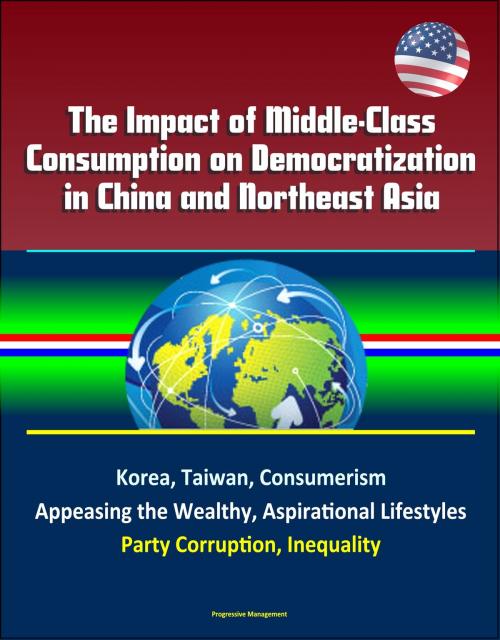The Impact of Middle-Class Consumption on Democratization in China and Northeast Asia: Korea, Taiwan, Consumerism, Appeasing the Wealthy, Aspirational Lifestyles, Party Corruption, Inequality
Nonfiction, History, Asian, Asia, China| Author: | Progressive Management | ISBN: | 9781370503957 |
| Publisher: | Progressive Management | Publication: | October 22, 2016 |
| Imprint: | Smashwords Edition | Language: | English |
| Author: | Progressive Management |
| ISBN: | 9781370503957 |
| Publisher: | Progressive Management |
| Publication: | October 22, 2016 |
| Imprint: | Smashwords Edition |
| Language: | English |
This important report has been professionally converted for accurate flowing-text e-book format reproduction. Despite four decades of astonishing economic growth, China's authoritarian government remains firmly entrenched in power. This fact challenges modernization theory, which anticipates that as countries become wealthier they will also become more democratic. This study proposes that middle-class consumption is a missing variable in the causal chain for democratization in Northeast Asian countries under authoritarian control. The study examines the effects of consumption in a cross-country comparison of South Korea and Taiwan during the years immediately prior to their respective democratizations. South Korea's middle-class consumption patterns evolved after decades of rapid economic growth, and state-induced wage pressure made the aspirational middle-class lifestyle unaffordable to lower middle-class Koreans. This consumption disparity caused the structurally disadvantaged working-class Koreans to join national protests that ultimately ushered in democracy. Examining modern China, the study finds a similar consumption disparity among the middle classes resulting from income inequality and a mobility-restraining household registration system. There exists a key political tension around structurally disadvantaged Chinese migrant workers earning lower wages and lacking welfare mechanisms afforded to urban residents under the hukou system. With the size of China's lower middle class expected to sharply expand over the next decade, the tension around consumption could act as a catalyst for middle-class led democratization.
CHAPTER I - INTRODUCTION * A. QUESTION AND ARGUMENT * B. SIGNIFICANCE OF THE RESEARCH QUESTION * C. VARIABLES AND POTENTIAL EXPLANATIONS * D. RESEARCH DESIGN * E. MAIN FINDINGS AND ROADMAP * CHAPTER II - LITERATURE REVIEW * A. OVERVIEW * B. MODERNIZATION THEORY * C. CONSUMPTION THEORY * D. CHINA'S MIDDLE CLASS * E. POLITICAL ECONOMY OF DEMOCRATIC TRANSITIONS * CHAPTER III - KOREA AND TAIWAN * A. INTRODUCTION * B. KOREA * 1. Economic Causal Factors for Democratization * 2. Political Causal Factors of Democratization * 3. South Korea's Middle Class * 4. Middle-Class Consumption * C. TAIWAN * 1. American Patronage * 2. Soft Authoritarianism and Export-Oriented Growth * 3. Intervening Variables for Democratization * 4. Taiwan's Middle Class * 5. CONCLUSION * D. COUNTRY COMPARISON: KOREA AND TAIWAN * CHAPTER IV - CHINA * A. INTRODUCTION * B. REFORM AND ECONOMIC RISE * C. POLITICAL TENSIONS: MAJOR FAULT LINES * 1. Suppression of Democratic Starts: Tiananmen * 2. Inequality * 3. Party Corruption * 4. Residency * 5. Media Control * 6. Welfare * 7. Environmental Issues * D. CONSUMPTION IN MAO-ERA CHINA * E. CONSUMPTION IN POST-MAO CHINA * F. CHINA'S RISING MIDDLE CLASS * 1. Attitudes Toward Political Change * 2. Success: Money And Social Status * 3. Aspirational Lifestyles * G. IMPACT OF MIDDLE-CLASS CONSUMPTION * H. POLITICAL INACTION AMONG CHINA'S MIDDLE CLASS * 1. Consumerism * 2. Crisis Intervention * 3. Appeasing the Wealthy * I. FUTURE PROSPECTS OF MIDDLE-CLASS DEMOCRATIZATION * J. CONCLUSION * CHAPTER V - CONCLUSION
This important report has been professionally converted for accurate flowing-text e-book format reproduction. Despite four decades of astonishing economic growth, China's authoritarian government remains firmly entrenched in power. This fact challenges modernization theory, which anticipates that as countries become wealthier they will also become more democratic. This study proposes that middle-class consumption is a missing variable in the causal chain for democratization in Northeast Asian countries under authoritarian control. The study examines the effects of consumption in a cross-country comparison of South Korea and Taiwan during the years immediately prior to their respective democratizations. South Korea's middle-class consumption patterns evolved after decades of rapid economic growth, and state-induced wage pressure made the aspirational middle-class lifestyle unaffordable to lower middle-class Koreans. This consumption disparity caused the structurally disadvantaged working-class Koreans to join national protests that ultimately ushered in democracy. Examining modern China, the study finds a similar consumption disparity among the middle classes resulting from income inequality and a mobility-restraining household registration system. There exists a key political tension around structurally disadvantaged Chinese migrant workers earning lower wages and lacking welfare mechanisms afforded to urban residents under the hukou system. With the size of China's lower middle class expected to sharply expand over the next decade, the tension around consumption could act as a catalyst for middle-class led democratization.
CHAPTER I - INTRODUCTION * A. QUESTION AND ARGUMENT * B. SIGNIFICANCE OF THE RESEARCH QUESTION * C. VARIABLES AND POTENTIAL EXPLANATIONS * D. RESEARCH DESIGN * E. MAIN FINDINGS AND ROADMAP * CHAPTER II - LITERATURE REVIEW * A. OVERVIEW * B. MODERNIZATION THEORY * C. CONSUMPTION THEORY * D. CHINA'S MIDDLE CLASS * E. POLITICAL ECONOMY OF DEMOCRATIC TRANSITIONS * CHAPTER III - KOREA AND TAIWAN * A. INTRODUCTION * B. KOREA * 1. Economic Causal Factors for Democratization * 2. Political Causal Factors of Democratization * 3. South Korea's Middle Class * 4. Middle-Class Consumption * C. TAIWAN * 1. American Patronage * 2. Soft Authoritarianism and Export-Oriented Growth * 3. Intervening Variables for Democratization * 4. Taiwan's Middle Class * 5. CONCLUSION * D. COUNTRY COMPARISON: KOREA AND TAIWAN * CHAPTER IV - CHINA * A. INTRODUCTION * B. REFORM AND ECONOMIC RISE * C. POLITICAL TENSIONS: MAJOR FAULT LINES * 1. Suppression of Democratic Starts: Tiananmen * 2. Inequality * 3. Party Corruption * 4. Residency * 5. Media Control * 6. Welfare * 7. Environmental Issues * D. CONSUMPTION IN MAO-ERA CHINA * E. CONSUMPTION IN POST-MAO CHINA * F. CHINA'S RISING MIDDLE CLASS * 1. Attitudes Toward Political Change * 2. Success: Money And Social Status * 3. Aspirational Lifestyles * G. IMPACT OF MIDDLE-CLASS CONSUMPTION * H. POLITICAL INACTION AMONG CHINA'S MIDDLE CLASS * 1. Consumerism * 2. Crisis Intervention * 3. Appeasing the Wealthy * I. FUTURE PROSPECTS OF MIDDLE-CLASS DEMOCRATIZATION * J. CONCLUSION * CHAPTER V - CONCLUSION















